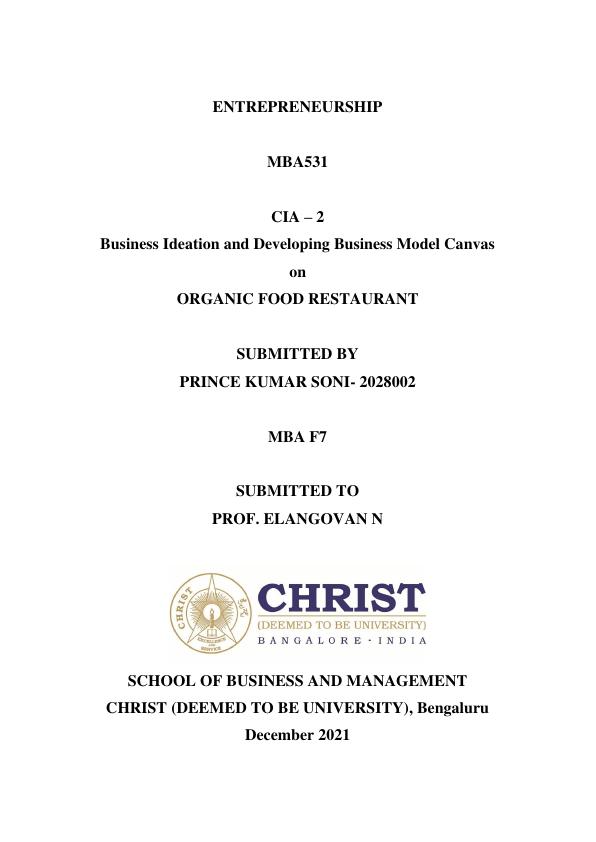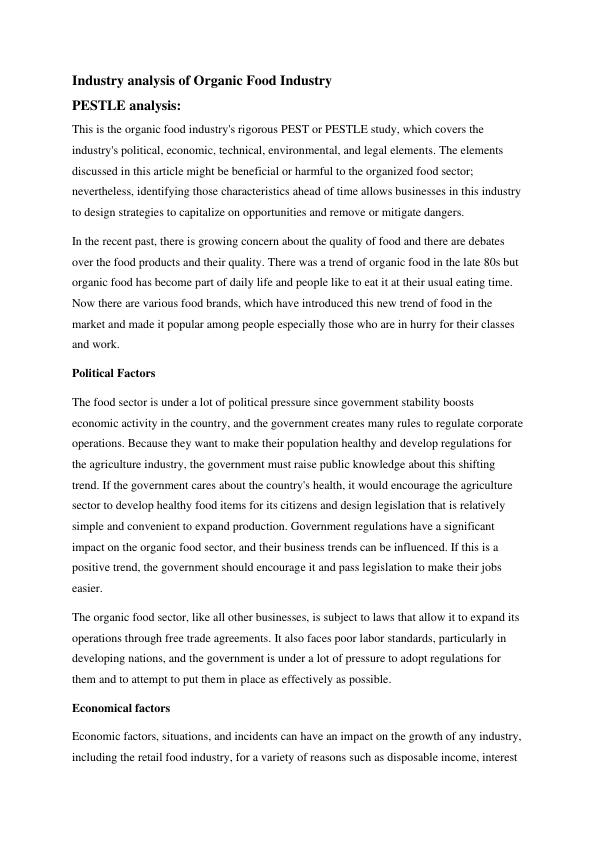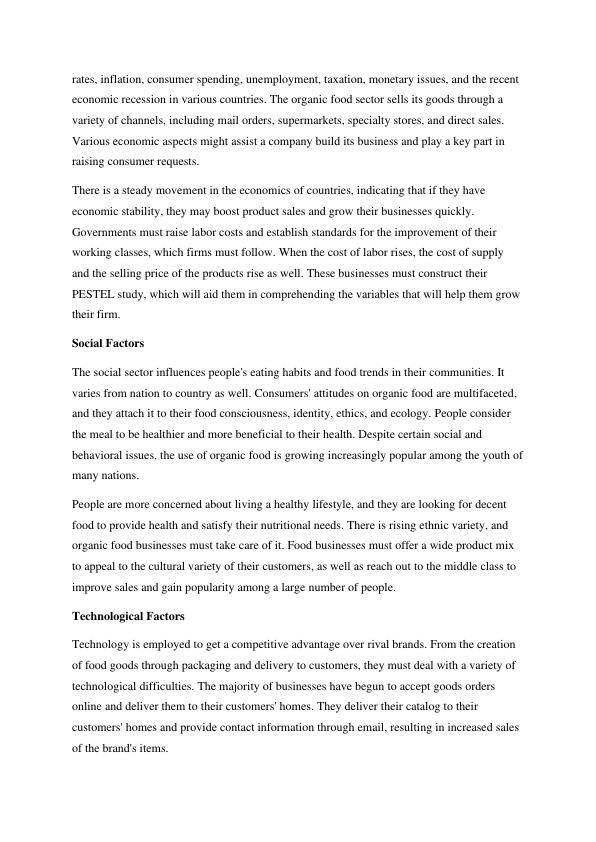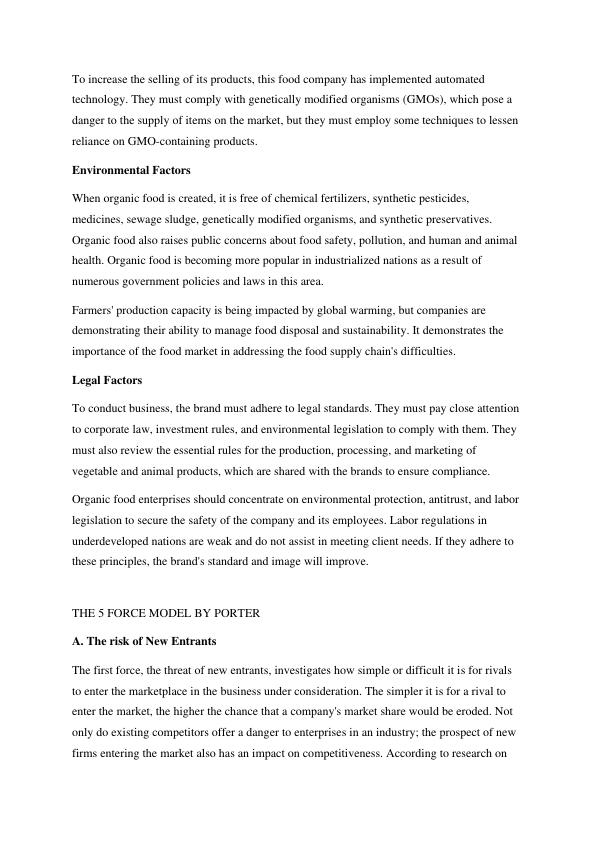MBA 531 Accounting for Managerial Decisions
Added on 2022-01-25
16 Pages5957 Words29 Views
ENTREPRENEURSHIP
MBA531
CIA – 2
Business Ideation and Developing Business Model Canvas
on
ORGANIC FOOD RESTAURANT
SUBMITTED BY
PRINCE KUMAR SONI- 2028002
MBA F7
SUBMITTED TO
PROF. ELANGOVAN N
SCHOOL OF BUSINESS AND MANAGEMENT
CHRIST (DEEMED TO BE UNIVERSITY), Bengaluru
December 2021
MBA531
CIA – 2
Business Ideation and Developing Business Model Canvas
on
ORGANIC FOOD RESTAURANT
SUBMITTED BY
PRINCE KUMAR SONI- 2028002
MBA F7
SUBMITTED TO
PROF. ELANGOVAN N
SCHOOL OF BUSINESS AND MANAGEMENT
CHRIST (DEEMED TO BE UNIVERSITY), Bengaluru
December 2021

Industry analysis of Organic Food Industry
PESTLE analysis:
This is the organic food industry's rigorous PEST or PESTLE study, which covers the
industry's political, economic, technical, environmental, and legal elements. The elements
discussed in this article might be beneficial or harmful to the organized food sector;
nevertheless, identifying those characteristics ahead of time allows businesses in this industry
to design strategies to capitalize on opportunities and remove or mitigate dangers.
In the recent past, there is growing concern about the quality of food and there are debates
over the food products and their quality. There was a trend of organic food in the late 80s but
organic food has become part of daily life and people like to eat it at their usual eating time.
Now there are various food brands, which have introduced this new trend of food in the
market and made it popular among people especially those who are in hurry for their classes
and work.
Political Factors
The food sector is under a lot of political pressure since government stability boosts
economic activity in the country, and the government creates many rules to regulate corporate
operations. Because they want to make their population healthy and develop regulations for
the agriculture industry, the government must raise public knowledge about this shifting
trend. If the government cares about the country's health, it would encourage the agriculture
sector to develop healthy food items for its citizens and design legislation that is relatively
simple and convenient to expand production. Government regulations have a significant
impact on the organic food sector, and their business trends can be influenced. If this is a
positive trend, the government should encourage it and pass legislation to make their jobs
easier.
The organic food sector, like all other businesses, is subject to laws that allow it to expand its
operations through free trade agreements. It also faces poor labor standards, particularly in
developing nations, and the government is under a lot of pressure to adopt regulations for
them and to attempt to put them in place as effectively as possible.
Economical factors
Economic factors, situations, and incidents can have an impact on the growth of any industry,
including the retail food industry, for a variety of reasons such as disposable income, interest
PESTLE analysis:
This is the organic food industry's rigorous PEST or PESTLE study, which covers the
industry's political, economic, technical, environmental, and legal elements. The elements
discussed in this article might be beneficial or harmful to the organized food sector;
nevertheless, identifying those characteristics ahead of time allows businesses in this industry
to design strategies to capitalize on opportunities and remove or mitigate dangers.
In the recent past, there is growing concern about the quality of food and there are debates
over the food products and their quality. There was a trend of organic food in the late 80s but
organic food has become part of daily life and people like to eat it at their usual eating time.
Now there are various food brands, which have introduced this new trend of food in the
market and made it popular among people especially those who are in hurry for their classes
and work.
Political Factors
The food sector is under a lot of political pressure since government stability boosts
economic activity in the country, and the government creates many rules to regulate corporate
operations. Because they want to make their population healthy and develop regulations for
the agriculture industry, the government must raise public knowledge about this shifting
trend. If the government cares about the country's health, it would encourage the agriculture
sector to develop healthy food items for its citizens and design legislation that is relatively
simple and convenient to expand production. Government regulations have a significant
impact on the organic food sector, and their business trends can be influenced. If this is a
positive trend, the government should encourage it and pass legislation to make their jobs
easier.
The organic food sector, like all other businesses, is subject to laws that allow it to expand its
operations through free trade agreements. It also faces poor labor standards, particularly in
developing nations, and the government is under a lot of pressure to adopt regulations for
them and to attempt to put them in place as effectively as possible.
Economical factors
Economic factors, situations, and incidents can have an impact on the growth of any industry,
including the retail food industry, for a variety of reasons such as disposable income, interest

rates, inflation, consumer spending, unemployment, taxation, monetary issues, and the recent
economic recession in various countries. The organic food sector sells its goods through a
variety of channels, including mail orders, supermarkets, specialty stores, and direct sales.
Various economic aspects might assist a company build its business and play a key part in
raising consumer requests.
There is a steady movement in the economics of countries, indicating that if they have
economic stability, they may boost product sales and grow their businesses quickly.
Governments must raise labor costs and establish standards for the improvement of their
working classes, which firms must follow. When the cost of labor rises, the cost of supply
and the selling price of the products rise as well. These businesses must construct their
PESTEL study, which will aid them in comprehending the variables that will help them grow
their firm.
Social Factors
The social sector influences people's eating habits and food trends in their communities. It
varies from nation to country as well. Consumers' attitudes on organic food are multifaceted,
and they attach it to their food consciousness, identity, ethics, and ecology. People consider
the meal to be healthier and more beneficial to their health. Despite certain social and
behavioral issues, the use of organic food is growing increasingly popular among the youth of
many nations.
People are more concerned about living a healthy lifestyle, and they are looking for decent
food to provide health and satisfy their nutritional needs. There is rising ethnic variety, and
organic food businesses must take care of it. Food businesses must offer a wide product mix
to appeal to the cultural variety of their customers, as well as reach out to the middle class to
improve sales and gain popularity among a large number of people.
Technological Factors
Technology is employed to get a competitive advantage over rival brands. From the creation
of food goods through packaging and delivery to customers, they must deal with a variety of
technological difficulties. The majority of businesses have begun to accept goods orders
online and deliver them to their customers' homes. They deliver their catalog to their
customers' homes and provide contact information through email, resulting in increased sales
of the brand's items.
economic recession in various countries. The organic food sector sells its goods through a
variety of channels, including mail orders, supermarkets, specialty stores, and direct sales.
Various economic aspects might assist a company build its business and play a key part in
raising consumer requests.
There is a steady movement in the economics of countries, indicating that if they have
economic stability, they may boost product sales and grow their businesses quickly.
Governments must raise labor costs and establish standards for the improvement of their
working classes, which firms must follow. When the cost of labor rises, the cost of supply
and the selling price of the products rise as well. These businesses must construct their
PESTEL study, which will aid them in comprehending the variables that will help them grow
their firm.
Social Factors
The social sector influences people's eating habits and food trends in their communities. It
varies from nation to country as well. Consumers' attitudes on organic food are multifaceted,
and they attach it to their food consciousness, identity, ethics, and ecology. People consider
the meal to be healthier and more beneficial to their health. Despite certain social and
behavioral issues, the use of organic food is growing increasingly popular among the youth of
many nations.
People are more concerned about living a healthy lifestyle, and they are looking for decent
food to provide health and satisfy their nutritional needs. There is rising ethnic variety, and
organic food businesses must take care of it. Food businesses must offer a wide product mix
to appeal to the cultural variety of their customers, as well as reach out to the middle class to
improve sales and gain popularity among a large number of people.
Technological Factors
Technology is employed to get a competitive advantage over rival brands. From the creation
of food goods through packaging and delivery to customers, they must deal with a variety of
technological difficulties. The majority of businesses have begun to accept goods orders
online and deliver them to their customers' homes. They deliver their catalog to their
customers' homes and provide contact information through email, resulting in increased sales
of the brand's items.

To increase the selling of its products, this food company has implemented automated
technology. They must comply with genetically modified organisms (GMOs), which pose a
danger to the supply of items on the market, but they must employ some techniques to lessen
reliance on GMO-containing products.
Environmental Factors
When organic food is created, it is free of chemical fertilizers, synthetic pesticides,
medicines, sewage sludge, genetically modified organisms, and synthetic preservatives.
Organic food also raises public concerns about food safety, pollution, and human and animal
health. Organic food is becoming more popular in industrialized nations as a result of
numerous government policies and laws in this area.
Farmers' production capacity is being impacted by global warming, but companies are
demonstrating their ability to manage food disposal and sustainability. It demonstrates the
importance of the food market in addressing the food supply chain's difficulties.
Legal Factors
To conduct business, the brand must adhere to legal standards. They must pay close attention
to corporate law, investment rules, and environmental legislation to comply with them. They
must also review the essential rules for the production, processing, and marketing of
vegetable and animal products, which are shared with the brands to ensure compliance.
Organic food enterprises should concentrate on environmental protection, antitrust, and labor
legislation to secure the safety of the company and its employees. Labor regulations in
underdeveloped nations are weak and do not assist in meeting client needs. If they adhere to
these principles, the brand's standard and image will improve.
THE 5 FORCE MODEL BY PORTER
A. The risk of New Entrants
The first force, the threat of new entrants, investigates how simple or difficult it is for rivals
to enter the marketplace in the business under consideration. The simpler it is for a rival to
enter the market, the higher the chance that a company's market share would be eroded. Not
only do existing competitors offer a danger to enterprises in an industry; the prospect of new
firms entering the market also has an impact on competitiveness. According to research on
technology. They must comply with genetically modified organisms (GMOs), which pose a
danger to the supply of items on the market, but they must employ some techniques to lessen
reliance on GMO-containing products.
Environmental Factors
When organic food is created, it is free of chemical fertilizers, synthetic pesticides,
medicines, sewage sludge, genetically modified organisms, and synthetic preservatives.
Organic food also raises public concerns about food safety, pollution, and human and animal
health. Organic food is becoming more popular in industrialized nations as a result of
numerous government policies and laws in this area.
Farmers' production capacity is being impacted by global warming, but companies are
demonstrating their ability to manage food disposal and sustainability. It demonstrates the
importance of the food market in addressing the food supply chain's difficulties.
Legal Factors
To conduct business, the brand must adhere to legal standards. They must pay close attention
to corporate law, investment rules, and environmental legislation to comply with them. They
must also review the essential rules for the production, processing, and marketing of
vegetable and animal products, which are shared with the brands to ensure compliance.
Organic food enterprises should concentrate on environmental protection, antitrust, and labor
legislation to secure the safety of the company and its employees. Labor regulations in
underdeveloped nations are weak and do not assist in meeting client needs. If they adhere to
these principles, the brand's standard and image will improve.
THE 5 FORCE MODEL BY PORTER
A. The risk of New Entrants
The first force, the threat of new entrants, investigates how simple or difficult it is for rivals
to enter the marketplace in the business under consideration. The simpler it is for a rival to
enter the market, the higher the chance that a company's market share would be eroded. Not
only do existing competitors offer a danger to enterprises in an industry; the prospect of new
firms entering the market also has an impact on competitiveness. According to research on

End of preview
Want to access all the pages? Upload your documents or become a member.
Related Documents
PESTLE Analysis of Organic Food Industrylg...
|10
|2549
|51
Market Analysis: Case Study of Doorstep Organicslg...
|8
|1487
|20
Business Plan Report for Go Organic Go Organisationlg...
|14
|3021
|77
Starting a Business and Fundamentals of Marketinglg...
|11
|2713
|309
Starting a Business and Fundamentals of Marketinglg...
|10
|2657
|281
Business Plan for Eat Organiclg...
|21
|4370
|392
